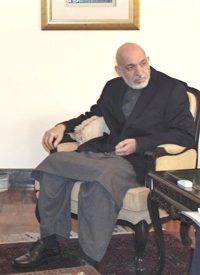
The President of Afghanistan has called for U.S. troop presence in his country to be limited to American military bases by 2013, insisting that the transition of control of the country to the Afghan military be moved up a year from the previously agreed to date. The announcement by President Hamid Karzai came only hours after President Obama had pledged to stick to the scheduled withdrawal of U.S. combat troops by 2014, the New York Times reported.
The announcement came while Secretary of Defense Leon Panetta was in Afghanistan meeting with government officials and apologizing about the U.S. soldier now charged with the killing of 16 Afghan civilians, including several children, in last Sunday's massacre. Upon the Defense Secretary's arrival, an interpreter employed by coalition forces crashed a stolen pickup truck near Panetta's plane.
The accelerated transfer announced by Karzai appears to be at odds with U.S. Department of Defense assessment that the Afghan military is not ready to assume the burden of defending the country against insurgents fighting the government forces and the more than 100,000 U.S. and NAT0 troops still in the country. But President Karzai said on Thursday that his military is ready to take over. "Even right now the Afghan security forces are ready to take all security responsibilities," he said.
Yet a Brookings Institute report, based on NATO numbers of a year ago, said only one of the Afghan National Army's 158 battalions had been rated as able to fight independently. And a Defense Department report to Congress last October said at least 70 percent of Afghan Army units still needed American assistance in the field as of last September, the Times reported.
"I don't think they are ready, and I don't think it would be feasible," said Stephen Biddle, a fellow at the Council on Foreign Relations who has studied the Afghan military. "Presidents of countries are not always military experts, and in particular presidents of host countries in a counterinsurgency where the foreign forces are not particularly popular."
Both U.S. and Afghan officials sought to downplay the significance of the announcement and its implications for a long-term strategic relationship between the two countries. Some noted that under the timetable agreed to 2010, foreign forces would have more of a supportive role by 2013, though they would still be active in combat, as needed, until 2014.
"I don't see how this changes the plan," a U.S. official, speaking anonymously told the Times.
In yet another development that could threaten transition plans, the Taliban insurgents announced Thursday that they are breaking off preliminary negotiations with the United Sates for a settlement of a war in which the United States and its NATO allies have been engaged for more than 10 years. Preliminary talks had begun earlier this year over release of some Taliban members from the U.S. prison on Guantanomo Bay, Cuba, but the statement issued by the Taliban Thursday claimed the American representative had changed the preconditions for negotiations. Gavin Sundwall, a spokesman for the U.S. Embassy in Kabul, told the Times that no talks of any substance have been held since January. American officials are prepared to resume discussions, he said, but he insisted the conditions for ongoing negotiations have not changed. The Taliban must first "make clear statements distancing itself from international terrorism and in support of a political process among all Afghans to end the conflict," Sundwall said.
Some members of the Afghan parliament, meanwhile, were reported to be outraged that the U.S. Army staff sergeant charged with last Sunday's murders had been moved to Kuwait for a U.S. military trial there. Some members had insisted that the soldier should be tried in Afghanistan. Panetta said he assured the Afghan President that the crime would be thoroughly investigated and prosecuted by the United States.
"I again pledged to him that we are proceeding with the full investigation here and that we will bring the individual involved to justice," Panetta told reporters after the meeting.
"And he accepted that and hoped that it could be a transparent process so that the Afghanistan people would see that the Unites States is indeed going to not only prosecute this individual, but ensure that he is held accountable." Panetta said.
The Defense Secretary stressed the need to stay the course in Afghanistan, even as the course was becoming increasingly unclear.
"We are on the right path," he said. "I am absolutely convinced of that but the key right now is to stick to that path. And if we do anything precipitous to back away from that, I think that, in my mind, could very well jeopardize our mission.
Photo: Afghanistan's President Hamid Karzai met with U.S. Defense Secretary Leon Panetta (out of picture) in Kabul, on March 15, 2012.



